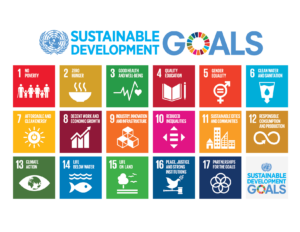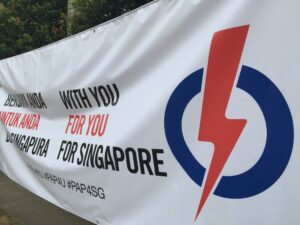Over the past few weeks, I had the opportunity to study economic and social growth in Singapore, a small island city-state in Southeast Asia. As a main focus of the project, I examined their progress toward attaining the United Nations Sustainable Development Goals, particularly goals 16, 11, and 6.

Graphic From https://sdgs.un.org/goals
Throughout the research process, I found they had made significant progress toward all three, far surpassing my original expectations. When I then met to discuss with other groups, however, I discovered that my findings were not mirrored across the Global South. In fact, it appeared Singapore was the outlier. But why is this the case? What factors have facilitated progress in Singapore that are absent elsewhere? What common characteristics act as a barrier to a more sustainable future?
I believe the answer lies in domestic and international influences, beginning with the impact of governance and domestic stability.

Photo By Jacklee (Wikipedia User) Shared Under Creative Commons Attribution-Share Alike 4.0 International license
Singapore has a strong authoritarian regime, with the People’s Action Party having been in power since the state gained its independence. Beyond stability, their government is also known for its lack of corruption, ranking as the 5th least corrupt state in the world according to Transparency International’s 2022 data. Together, these factors create a foundation upon which Singapore has been able to rapidly develop its economy- transforming from a British colony to one of the wealthiest countries in the world. Strong economic policies that incentivized foreign investment and attracted multinational corporations have allowed the state to flourish as a center on entrepôt trade. These successes have then allowed the government to fund several sustainability initiatives, including key social policies.
Over the past 50 years, Singapore created an extensive public housing program that has eliminated slums and helped overcome the challenges of limited land. Funding has also been funneled toward infrastructure and institutions. In all three cases, these initiatives and the resulting progress toward the UN SDGs can be traced back to the successes of their government.
Other states, however, have not been so fortunate. Sri Lanka, for example, has struggled with corruption and the impacts of poor government economic and taxation policies. Such shortcomings have resulted in a growing income gap, a cost of living crisis, and food scarcity. Even recent efforts to increase sustainability have been met with mixed results. A recent domestic ban on the use of pesticides and other farming chemicals was intended to establish organic farming. Instead, the poorly implemented policy resulted in a major reduction in yields and, ultimately, a food shortage.
Algeria is yet another example of a state struggling to meet sustainability goals due to domestic unrest and government instability. Following successive wars, including a civil war from 1992-2002, the military gained major political influence. Elections have since become a farce in which military leadership selects politicians they can successfully control. This, in turn, has resulted in corruption and unrest. Rampant terrorist activity has further weakened the state, and with such frequent domestic upheaval, it is little wonder Algeria has made limited progress toward sustainability. In a state fighting to establish basic levels of peace and security, there are limited resources to turn toward secondary goals such as the UN SDGs.
Domestic climate alone, however, is not the only determinant of progress. International factors are also at play.
Returning to Singapore, it is easy to see how ASEAN, the Association of Southeast Asian Nations, has facilitated better access to global markets, which in turn has allowed the state to advocate for its economic needs. As a center for international trade, Singapore has also benefited from globalization and the increased movement of goods. Its main concern moving forward is the need to diversify the economy, as any state wholly dependent on the global market will remain vulnerable to shocks due to changing patterns of trade.

Sri Lanka Tourism Advertisement. Source: Lonely Planet
Sri Lanka has already experienced this reality. In their economy, the largest and most funded sector is tourism. Pre-pandemic, this was facilitating some economic growth for the nation at large, but with COVID-19, and the many travel restrictions, the economy now faces a worsening recession. Algeria also remains vulnerable to global market trends. As a rentier state dependent on its natural gas and oil resources, fluctuations in demand mean fluctuations in the economy as a whole.
In all cases, we see the influence of global systems on state welfare, and while Singapore has felt less significant consequences of such dependency, it is clear all three states would be better served by diversifying their economies to create long-term stability- stability that appears to be the determinant of progress. Whether domestically established through strong governance and the elimination of corruption or supported internationally by regional organizations and more diversified trade, stability allows for states to grow economically and make progress sustainably. Only once there is a strong foundation in place, like that we currently witness in Singapore, can a state successfully take on the United Nations Sustainable Development Goals.
May 3, 2023 at 7:15 pm
Quite a thorough analysis. How well does it generalize beyond these specific cases, I wonder?
One point on Algeria: it has been effectively a single-party state since independence in 1962, with the military a strong political force from the beginning. The civil war of the 1990s only consolidated the pre-existing dominance of the party and military elite, after a brief experiment in limited democratization as the Cold War ended. Young Algerians want democracy, but they are fighting against sixty years of authoritarianism preceded by well over a century of colonization. The colonial and liberation experience of each of your three cases was quite distinctive.
May 4, 2023 at 2:23 pm
Thank you for your elaboration on the political climate of Algeria. I was unaware of the many nuances of the situation.
When it comes to a broader application, I do think these patterns would hold true. Virtually all progress toward the UN Sustainable Development Goals is dependent on economic well-being, and that economic vitality seems to be inextricably linked with the domestic stability of a state. This makes sense when one considers that many states in the Global South are dependent on foreign investment and multinational corporations. MNCs will not invest where there is domestic turbulence due to the potential risks. Looking at Singapore in comparison to its neighbors is a perfect example. With government longevity, strong legal systems and pro-business policies, Singapore is an ideal place to invest and establish regional headquarters. Indonesia, on the other hand, is less favorable for such ventures due to political and civil unrest.
International factors such as the global market also have a hand in determining economic growth. In an age of wide-spread globalization, (almost) all countries are affected by market trends to at least some degree. In states where economies lack diversity, change is particularly impactful, as we have seen with pandemic related disruption.
In both cases, economic prosperity is the intervening variable between the causes: domestic and economic stability, and the outcome: the progress, or the lack there of, toward attaining the UN Sustainable Development Goals. This pattern is particularly visible with the cases I chose to highlight, but also more widely applicable.
May 7, 2023 at 3:02 pm
Thank you Claire for your engaging blog post! It was certainly interesting to learn about Singapore and its significant progress towards goals 16,11 and 6. I was also shocked to learn that other countries across the Global South have not necessarily progressed nearly as well as Singapore. One of the main reasons for the country’s success in the SDG’s is domestic stability and the lack of corruption. The Political and Economic Risk Consultancy ranked Singapore as the least corrupt country in 2022. Unfortunately, many of Singapore’s neighboring countries face corruption which hinders their economic and political development. How do you think these countries can eradicate corruption to move towards attaining the UN Sustainable Development Goals?